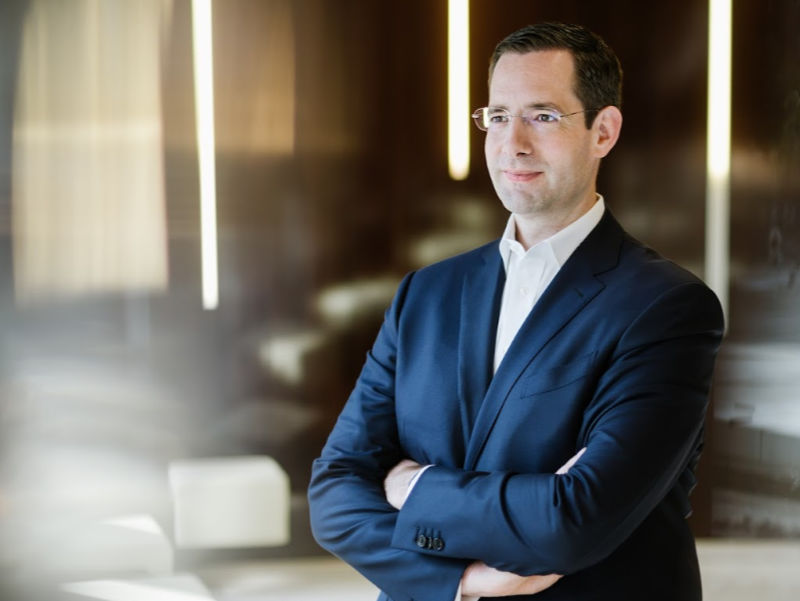Paul Holmes 07 Jul 2020 // 9:59AM GMT

NEW YORK — Corporate and financial communications firms Finsbury and Hering Schuppener, and public affairs specialist Glover Park Group — strategic partners for the past three years — are coming together to form Finsbury Glover Hering, PRovoke Media can reveal.
The deal will see executives from the three companies take up 49.99% of the equity in the combined firm, with WPP owning a 50.01% majority. WPP had previously owned 100% of Finsbury and Glover Park, and a 56% stake in German powerhouse Hering Schuppener.
Finsbury founder Roland Rudd and GPG founder Carter Eskew will co-chair the new firm, with Alexander Geiser (pictured), managing partner at Hering Schuppener, serving as chief executive officer and more than 100 executives from across the three firms holding equity. WPP will be represented on the board of directors by its chief executive officer Mark Read.
“We started talking about this five years ago,” says Rudd. Finsbury and Hering Schuppener announced a formal partnership a year later, in 2016, with Glover Park joining the alliance a year later. The partners have since worked in multiple markets and across multiple sectors for more than 100 shared clients, according to Geiser.
“But the fact is we have not been one company,” says Rudd. “Making it one company with a clear strategy and a clear structure and a single management board will make a significant difference.”
The new firm, which will be headquartered in New York with operations in Abu Dhabi, Beijing, Berlin, Brussels, Dubai, Dublin, Düsseldorf, Frankfurt, Hong Kong, London, Los Angeles, Moscow, Riyadh, Shanghai, Singapore, Tokyo and Washington DC, (along with affiliates in other key markets) will offer clients expertise in three primary areas:
- Capital markets communications—the firms have advised on more than 1,500 transactions with a total value of more than $2 trillion in the past decade alone, and the partnership ranked third in mergermarket’s global ranking of financial transaction advisors last year, based on value of deals worked.
- Public affairs and issues management, with deep policy expertise in Washington, via GPG, and in several European capitals—including Brussels—via Hering Schuppener.
- Corporate reputation management, including crisis counsel, with expertise in CEO positioning CEOs, change communications and other high-stakes challenges.
The deal most obviously positions Finsbury Glover Hering — with 700 employees and global fee income of slightly more than $200 million, the firm will rank among the top 15 PR agencies in the world — to compete with other global specialists in C-suite communications, most notably Brunswick and FTI Consulting, but also Publicis Groupe’s Kekst CNC, which itself was formed through a merger two years ago.
But beyond that, Finsbury Glover Hering will give WPP the ability to compete with management consulting firms, who have been making acquisitions in the communications space—especially at the high-end of the market where clients need help with mission-critical issues. Says Geiser, “If you look at what’s happening in the world, the kind of reputational challenges and societal issues that companies are dealing with, companies and institutions face heightened expectations of transparency and purpose, and increased public and stakeholder scrutiny.
“These issues are not just about the capital markets or the policy realm, they require the ability to communicate with all of an organization’s stakeholders.”
That shifting landscape may explain why WPP was willing to surrender its 100% ownership of Finsbury and Glover Park, acquired in 2001 and 2011 respectively. There was speculation in 2018, following the merger of Burson-Marsteller and Cohn & Wolfe, that WPP might be open to selling some of its PR operations to management, but this deal is the first of its kind, allowing WPP to maintain a majority position while incentivizing key talent — and one that is difficult to imagine happening when Sir Martin Sorrell was leading the giant holding company.
As Geiser explains, “Holding companies like WPP are facing competition from Accenture and BCG and others. This is a way for them to compete with management consulting firms.”
While it is being described by sources at FGH as a “management buy-in,” the deal does not meet the traditional definition of an MBI (which typically involved outside management taking ownership and replacing existing managers). Rather, managers — including the original owners of both Finsbury and Glover Park — are "buying in" to the future of the firm in a re-equitization of the company.
That re-equitization givesmanagement, and senior executives from all three firms a stake in the future of the business and an incentive to commit for the long-term, as well as offering new talent a unique opportunity, according to Rudd. “Our interests are completely and utterly aligned,” he adds.



































.jpg)

















